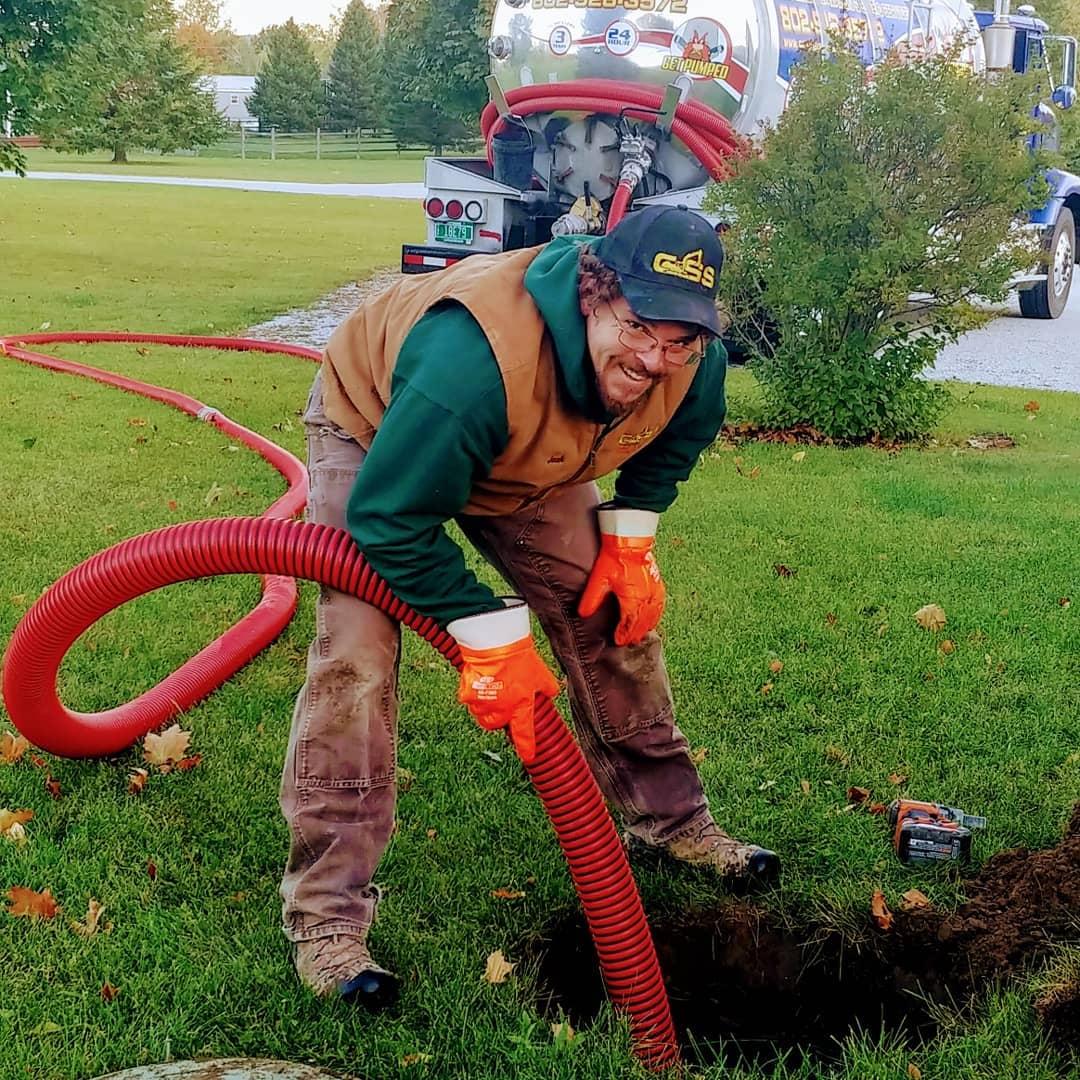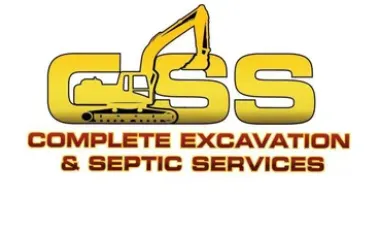
Proudly Serving Parts Of:
Grand Isle, Franklin & Chittenden Counties, VT
and Clinton County, NY
Septic Inspections FAQs
We Help Realtors With Septic Inspections!
Your Top rated Complete Excavation & Septic Services Company Committed to superior quality and results!
Thanks for clicking! Check out our premium services below.👷
Where is the best septic tank inspection near me?
Septic tank inspections demand the expertise of certified and licensed professionals. It's vital to engage an inspector with the appropriate experience, given that inspection requirements can vary by state. Ensure your selected septic inspector possesses the necessary qualifications.
We specialize in comprehensive septic inspections for various tank types. Our team is both licensed and certified. Alongside inspections, our services cover septic tank repair, pumping, installation, engineered septic systems, alternative septic systems, and porta potty solutions.
Who does septic tank inspection?
Not everyone is qualified to conduct a septic tank inspection. Only certified and licensed septic inspectors have the expertise to perform this task. Additionally, septic tank inspection requirements differ by state, so it's important to hire an inspector with the necessary experience and knowledge.
We specialize in septic inspections for various types of septic tanks. Our team is licensed and certified, offering a range of septic services, including tank repair, pumping, installation, engineered septic systems, alternative septic systems, and porta potty solutions.
Who pays for a septic tank inspection?
The responsibility for covering the cost of a septic tank inspection typically falls on the property owner. It's considered part of routine maintenance and is crucial for identifying potential issues before they become more significant problems. Property owners should budget for periodic septic inspections to ensure the proper functioning of their septic systems.
We offer septic inspection services, and property owners are generally responsible for the associated costs. This investment in inspection can save money in the long run by addressing issues early on and preventing more extensive and expensive repairs.
How much does a septic inspection cost?
The cost of a septic inspection can vary based on factors such as the location, the complexity of the system, and the specific services provided. Generally, you can expect to pay anywhere from $200 to $600 for a standard septic tank inspection. It's advisable to obtain quotes from reputable septic inspectors in your area to get a more accurate estimate based on your unique circumstances.
We provide transparent pricing for septic inspections. The cost will depend on various factors, and we recommend reaching out for a personalized quote tailored to your specific needs and location.
Why would a septic inspection fail?
A septic inspection may fail for several reasons, including the discovery of leaks, blockages, or structural damage in the septic system. Additionally, inadequate drainage, excessive sludge or scum accumulation, and malfunctioning components can contribute to a failed inspection. Addressing these issues promptly is crucial to maintain the proper functioning of the septic system and prevent potential health and environmental hazards.
What happens if the septic tank inspection fails?
If a septic tank inspection fails, it signifies that there are issues or deficiencies within the septic system. The nature of the failure could range from leaks and blockages to structural damage or malfunctioning components. Swift action is essential to rectify the identified issues, as a failed inspection indicates potential risks to both the environment and public health. Timely repairs and necessary maintenance will be required to bring the septic system back to compliance and ensure its proper functionality.
Is a septic tank inspection really necessary?
Undergoing a septic tank inspection is indeed necessary for several reasons. Firstly, it helps identify any existing or potential issues within the septic system, allowing for timely repairs and preventive measures. Regular inspections contribute to the longevity and efficient performance of the septic system, preventing more significant problems that could arise if issues go unnoticed.
Additionally, many local regulations and health codes mandate periodic septic inspections to ensure compliance and prevent environmental contamination. Therefore, property owners should consider septic tank inspections as a crucial aspect of responsible homeownership and environmental stewardship.
Should I get a septic inspection when buying a house?
Certainly, obtaining a septic inspection when buying a house is highly recommended. This proactive step can unveil any underlying issues with the septic system before the property transaction is finalized. It provides valuable insights into the condition and functionality of the septic tank, drain field, and associated components.
By conducting a septic inspection during the home-buying process, potential buyers can make informed decisions and negotiate repairs or adjustments if needed. It helps avoid unexpected and costly surprises after the property has changed hands. Overall, investing in a septic inspection as part of the home-buying process is a prudent measure to ensure the long-term stability and functionality of the septic system.
How do I get my septic to pass inspection?
Ensuring your septic system passes inspection involves a few key steps. First, regular maintenance, such as routine pumping and proper waste disposal, helps prevent issues like excessive sludge and scum buildup. Addressing any identified concerns promptly is crucial to maintaining the system's health.
Furthermore, being mindful of what goes into the septic system, avoiding flushing harmful substances, and managing water usage can contribute to its overall well-being. If issues arise during an inspection, collaborating with a professional, such as us, for necessary repairs and following their recommendations ensures your septic system is in compliance and operates efficiently.
What is involved in a septic tank inspection?
A comprehensive septic tank inspection involves a detailed examination of various components within the system. This includes assessing the structural integrity of the tank, checking for leaks, measuring sludge and scum levels, inspecting the drain field, and ensuring the proper functioning of associated elements like pumps and alarms. The inspector may also evaluate the system's compliance with local regulations and health codes.
During the inspection process conducted by us, each critical aspect of the septic system is carefully reviewed. This thorough examination aims to identify any existing problems or potential issues, allowing for prompt and effective solutions to maintain the optimal performance of the septic system.
How often should septic tanks be inspected?
The frequency at which septic tanks should be inspected depends on various factors, including the tank's size, usage, and local regulations. As a general guideline, it is recommended to have a septic tank inspection every 3 to 5 years. However, high-usage households or older systems may require more frequent inspections, possibly annually.
Regular inspections help identify and address potential issues before they escalate, contributing to the longevity and proper functioning of the septic system. We can provide guidance on the appropriate inspection schedule based on your specific circumstances and system requirements.
What to know when buying a house with a septic tank?
When considering buying a house with a septic tank, there are several important factors to be aware of. It's crucial to inquire about the age and condition of the septic system. Ask for maintenance records and details of any recent inspections or repairs. Understanding the location of the septic tank and drain field is also essential.
Additionally, check if the property adheres to local regulations regarding septic systems and inquire about any potential issues that may have been identified during previous inspections. Being well-informed about the septic system's status is vital for making an informed decision about the property purchase.
Before finalizing the purchase, it's advisable to have a professional inspection, like the services offered by us, to ensure the septic system is in good condition and meets all necessary requirements.
What to ask a septic inspector?
When engaging a septic inspector, asking pertinent questions is crucial. Consider inquiring about their certification and licensing to ensure they meet the necessary standards. Ask about their experience and expertise in conducting septic tank inspections, especially if your system has specific features or complexities.
It's also beneficial to discuss the inspection process itself, including the components they will assess and any potential issues they commonly encounter. Understanding the inspection findings, the condition of your septic system, and any recommended maintenance or repairs is essential for informed decision-making.
Can you inspect a septic tank without pumping it?
Inspecting a septic tank typically involves accessing and evaluating its components, and in many cases, this requires pumping the tank to access the interior. While it is technically possible to perform a visual inspection without pumping, a comprehensive assessment often involves both inspection and pumping to ensure a thorough examination of the entire system.
We understand the importance of a comprehensive inspection and can provide guidance on the best approach for your specific septic system. Their experienced team can determine the most suitable inspection method based on the system's characteristics and your needs.
What is a septic tank inspection pipe cap?
A septic tank inspection pipe cap is a protective covering that is usually placed on the access pipe of a septic tank. This cap serves to secure the opening of the pipe, preventing debris, soil, or other materials from entering the tank. The inspection pipe cap is a crucial component, as it facilitates easy access for inspectors during routine examinations or maintenance procedures.
These caps are designed to be durable and tightly sealed to maintain the integrity of the septic system. If you have any concerns about your septic tank inspection pipe cap or if you're in need of a replacement, consulting with a professional, such as us, can ensure the proper functioning of this essential component.
What is a septic tank inspection port?
A septic tank inspection port is a designated access point on the septic tank designed to facilitate examination, maintenance, and pumping activities. It serves as an entryway for inspectors to assess the internal conditions of the tank without the need for extensive digging or uncovering.
The inspection port typically has a secure cover or lid that can be easily opened for inspection purposes. This feature allows professionals like us to efficiently evaluate the contents, levels, and overall condition of the septic tank during routine inspections or when addressing specific issues. Regular maintenance of the inspection port ensures ongoing functionality and accessibility for necessary assessments.
What is a septic tank inspection chamber?
A septic tank inspection chamber is a designated space or compartment within the septic system that provides access for inspections and maintenance activities. This chamber is designed to be easily accessible and typically contains components such as pipes, baffles, or filters that play a crucial role in the functioning of the septic system.
During a septic tank inspection, professionals, like us, may access the inspection chamber to assess the condition of these components and ensure they are functioning correctly. The chamber's design allows for efficient inspection and, if necessary, prompt maintenance to address any issues identified during the examination process.
What are the benefits of a septic system camera inspection?
The benefits of a septic system camera inspection are numerous. This advanced technique involves using a specialized camera to visually inspect the interior of the septic pipes and components. Some advantages of this method include:
1. Precision: Camera inspections allow for a detailed and accurate assessment of the condition of pipes, identifying issues such as cracks, blockages, or leaks.
2. Efficiency: It offers a faster and more efficient means of diagnosing problems compared to traditional methods, saving time during the inspection process.
3. Preventive Maintenance: Identifying potential issues early on helps prevent major problems, allowing for timely repairs and maintenance.
4. Cost-Effective: While it may involve an initial cost, camera inspections can save money in the long run by addressing issues before they escalate into larger, more expensive problems.
5. Documentation: The recorded footage provides clear documentation of the septic system's condition, which can be useful for future reference or during property transactions.
Choosing a reputable service provider, such as us, for a septic system camera inspection ensures a thorough and efficient assessment of your septic system.
What is a septic tank certification?
A septic tank certification is a formal confirmation, typically provided by a certified inspector, stating that a septic system meets specific standards and is in compliance with local regulations.
This certification is often required during property transactions, ensuring that the septic system is functioning properly and poses no immediate risks.
We can assist in obtaining a septic tank certification by conducting a thorough inspection and, if necessary, addressing any issues to bring the system into compliance. This certification provides assurance to property owners and potential buyers regarding the health and functionality of the septic system.
What happens during a septic tank certification?
The process during a septic tank certification involves a certified inspector assessing the septic system to ensure it meets specific standards and complies with local regulations. The inspector examines various components of the system, including the tank, drain field, and associated elements. If any issues are identified, they may need to be addressed to bring the system into compliance.
During the certification process conducted by professionals like us, the inspector thoroughly evaluates the septic system's condition, providing assurance that it meets the necessary requirements. This certification is crucial, especially during property transactions, as it verifies the proper functioning of the septic system.
During a septic tank certification process, a certified inspector conducts a comprehensive assessment of the septic system's components and functionality. This evaluation typically includes examining the tank's structural integrity, checking for leaks or damage, measuring sludge and scum levels, inspecting the drain field, and ensuring the proper operation of associated elements like pumps or alarms.
We specialize in providing septic tank certifications, employing qualified inspectors to perform thorough evaluations. This certification confirms that the septic system meets regulatory standards and is in good working condition, providing peace of mind to property owners and potential buyers.
How long does it take to certify a septic tank?
The duration to certify a septic tank can vary depending on factors such as the size and complexity of the system, as well as any issues identified during the inspection. Generally, the certification process may take a few hours to complete.
We, during the certification process, aims for efficiency without compromising thoroughness. The timeline for certification may be influenced by the need for additional assessments, repairs, or any specific requirements to meet regulatory standards. Property owners can inquire about the expected timeline for their individual case during the consultation with the inspection team.
What are the signs of a full septic tank?
Signs of a full septic tank can include slow draining fixtures, gurgling sounds in plumbing, unpleasant odors in and around the home, and sewage backups. These indicators suggest that the septic tank is reaching its capacity, and immediate attention is required to prevent potential damage to the system and avoid health and environmental hazards.
Regular maintenance, including periodic pumping, is essential to prevent a septic tank from becoming overly full. Property owners should be vigilant for these signs and schedule professional services, like those offered by us, to address any issues promptly and ensure the proper functioning of the septic system.
How long do septic tanks last?
The lifespan of septic tanks can vary, but with proper care and regular maintenance, a well-designed and well-maintained septic system can last for several decades. On average, septic tanks may last anywhere from 20 to 40 years.
Factors influencing the lifespan of septic tanks include the quality of initial installation, the type of soil in the area, usage patterns, and adherence to proper maintenance practices. Regular inspections, pumping as needed, and responsible waste disposal all contribute to extending the life of a septic system.
We can provide guidance on maintaining the health and longevity of your septic tank, offering services such as inspections, pumping, and repairs to ensure the optimal performance of your septic system.

AVOID COSTLY MISTAKES:
Do NOT hire an excavating contractor without first reading our free guide:
The ULTIMATE Excavation & Septic "Success Guide."

Understanding the Role of a Septic Tank Inspections Contractor
Maintaining Your Septic System's Health and Functionality
Your septic system is a critical component of your property's wastewater management, ensuring that waste is safely processed and disposed of. It's essential to keep this system in optimal condition, and a professional septic tank inspections contractor plays a vital role in making that happen. In this article, we'll explore the responsibilities and benefits of hiring a septic tank inspections contractor and guide you through the process of finding the right contractor.
How Can We Help?


Contact Us Today For A Free Quote
The Role of a Septic Tank Inspections Contractor
1. Regular Inspections:
One of the primary responsibilities of a septic tank inspections contractor is to perform routine inspections of your septic system. These inspections are essential to identify any potential issues before they become major problems. Regular inspections help ensure that your system operates efficiently and avoids costly repairs or replacements down the line.
2. Pumping Services:
Septic tanks accumulate solid waste over time, which must be periodically pumped out to maintain proper functionality. A septic tank inspections contractor can assess the level of solids in your tank and recommend when pumping is necessary. They can also provide pumping services, ensuring your tank is clean and ready for efficient waste processing.
3. Troubleshooting and Repairs:
If problems are detected during an inspection, a septic tank inspections contractor can provide troubleshooting and repair services. Whether it's a minor issue with a component of your system or a more significant problem, their expertise allows them to diagnose and fix problems efficiently. This can save you time, money, and the inconvenience of a malfunctioning septic system.
4. Drainfield Maintenance:
The drainfield is a critical component of your septic system responsible for distributing treated wastewater into the ground. A septic tank inspections contractor can monitor the condition of your drainfield and address any issues that may arise. Proper maintenance of the drainfield is crucial for preventing backups and environmental contamination.
Benefits of Hiring a Septic Tank Inspections Contractor
1. System Longevity:
Regular inspections and maintenance can significantly extend the life of your septic system. By identifying and addressing issues early, you can avoid costly replacements and ensure your system serves you well for many years.
2. Environmental Protection:
A malfunctioning septic system can pose significant environmental risks, such as groundwater contamination and pollution. Hiring a septic tank inspections contractor helps prevent these issues, ensuring your system operates in an environmentally responsible manner.
3. Cost Savings:
Investing in routine inspections and maintenance may seem like an added expense, but it can save you a considerable amount in the long run. Repairing a damaged septic system or replacing it entirely can be exorbitantly expensive. Regular maintenance ensures that your system runs smoothly, avoiding such costly surprises.
4. Peace of Mind:
Knowing that your septic system is in good hands provides peace of mind. You can rest easy, knowing that your wastewater is being managed efficiently and that you're not contributing to environmental harm.
EXCAVATIOn & septic services WE CAN HELP WITH:
See Our Excavation & Full Site Preparation Services for Grand Isle, Franklin & Chittenden Counties, Vermont and Clinton County, New York

Your time and effort looking for the best excavation and septic contractor just paid off! We understand, you're probably searching for excavation companies near me and "Whammo!" up pops hundreds of excavation contractors claiming to provide the best excavation services. So who do you trust with your important site work? We understand it can be a little daunting. We are happy to help in any way and sincerely thank you for taking time to consider us! Here's some of our most popular excavation services we can help you with right away:
✔️ Site Preparation
✔️ Site work
✔️ Excavation Company
✔️ Excavation Contractor
✔️ Septic Tank Installations
✔️ Septic Tank Inspections
✔️ Drainage System Installation
✔️ Septic pumping
✔️ Concrete Contractor
✔️ Concrete Flatwork
✔️ Stone retaining walls
✔️ Concrete Patios
✔️ Concrete Slabs
✔️ Driveways
✔️ Foundation Repairs
✔️ Waterline Construction
✔️ Aerobic Septic Systems
We Take Pride In Quality Excavation Services Launched FAST!

When considering a local excavation contractor or excavation company what should you consider? Along with the highest quality site work you want your excavation services to be done quickly and without headaches.
You can also count on us for:
✔️ Lot clearing
✔️ Site Work
✔️ Road Excavating & Grading
✔️ Drainage
✔️ Basement excavation
✔️ Trenching - drain fields - irrigations
✔️ Digging Services
✔️ Small excavator services (and large)
✔️ Culverts
✔️ French Drains
✔️ Camera inspection - sewer & drain lines
✔️ Sewer & Drain repairs
✔️ Pipe Jetting and Thawing
✔️ Pipe cleanouts - Drain cleaning
✔️ Portable toilet rentals - port-o-potty - standard, handicap and construction sites and flush units with sink

WHAT'S IT LIKE WORKING WITH US?
Hiring a Septic Tank Inspections Contractor
When it comes to hiring a septic tank inspections contractor there are several steps to follow to ensure you find the right professional for the job.
1. Research and Recommendations:
Start by researching local contractors who specialize in septic tank inspections. You can ask for recommendations from friends, neighbors, or local businesses that have used these services before. Online reviews and directories can also provide valuable insights.
2. Licensing and Certification:
Verify that the contractor you're considering is licensed and certified to perform septic system inspections and maintenance. Proper licensing ensures that they have the necessary training and experience to handle the job.
3. Experience:
Experience matters in this field. Look for a contractor with a proven track record and years of experience. Experienced professionals are better equipped to identify and address issues effectively.
4. Insurance:
Make sure the contractor has liability insurance. This protects you in case of any accidents or damage that might occur during the inspection or maintenance work.
5. Written Estimates:
Request written estimates from multiple contractors. This allows you to compare prices and services to ensure you're getting a fair deal.
6. References:
Ask the contractor for references from past clients. Contact these references to inquire about their experiences with the contractor's services.
7. Contract and Terms:
Once you've selected a contractor, ensure that all terms, including costs, services, and timelines, are outlined clearly in a contract. This protects both you and the contractor and provides a clear understanding of the work to be done.
Hiring a septic tank inspections contractor is an essential step in maintaining your septic system's health and functionality. By following these guidelines and working with a reputable professional, you can ensure your septic system operates efficiently, protecting both your property and the environment. Don't overlook the importance of routine inspections and maintenance – they're key to a trouble-free septic system and peace of mind.
We Offer Complete Excavation & Septic Services Near You!
If you don't see your specific area contact us and we may still be able to help or give a referral.
Proudly serving Grand Isle, Franklin & Chittenden Counties, Vermont and Clinton County, New York

Hours:
Mon - Fri 9:00 am - 5:00 pm
Extended hours by appointment only.



All rights reserved | Privacy policy
